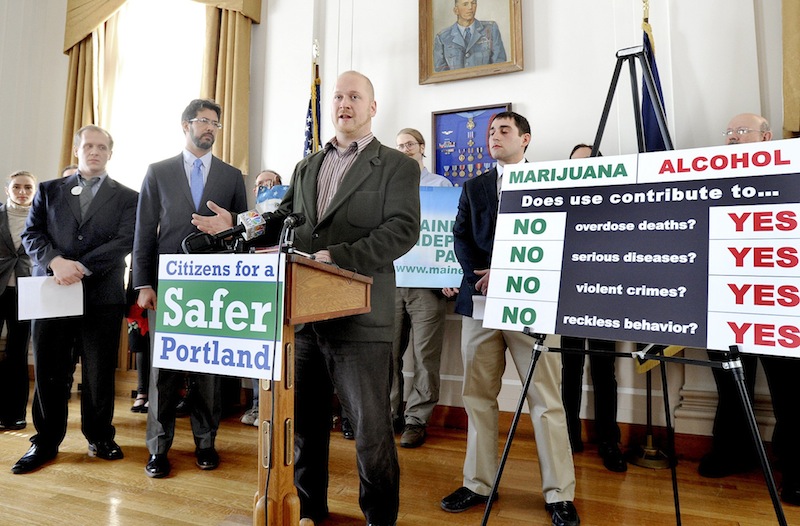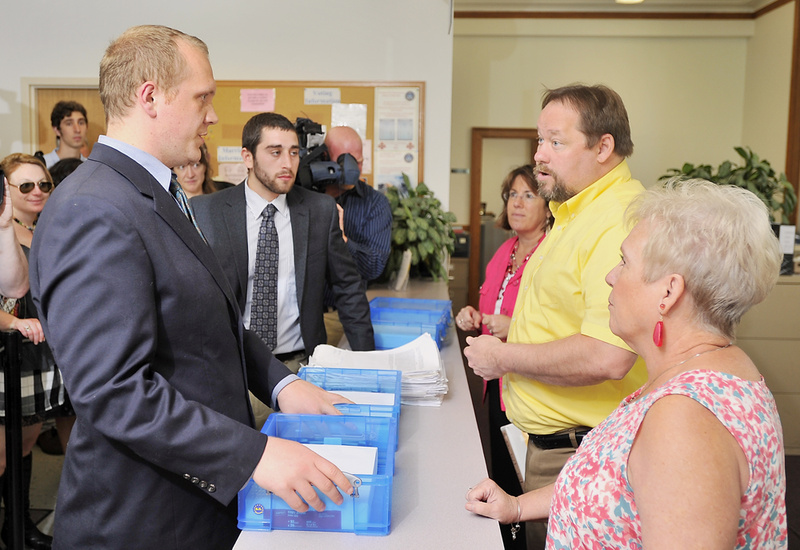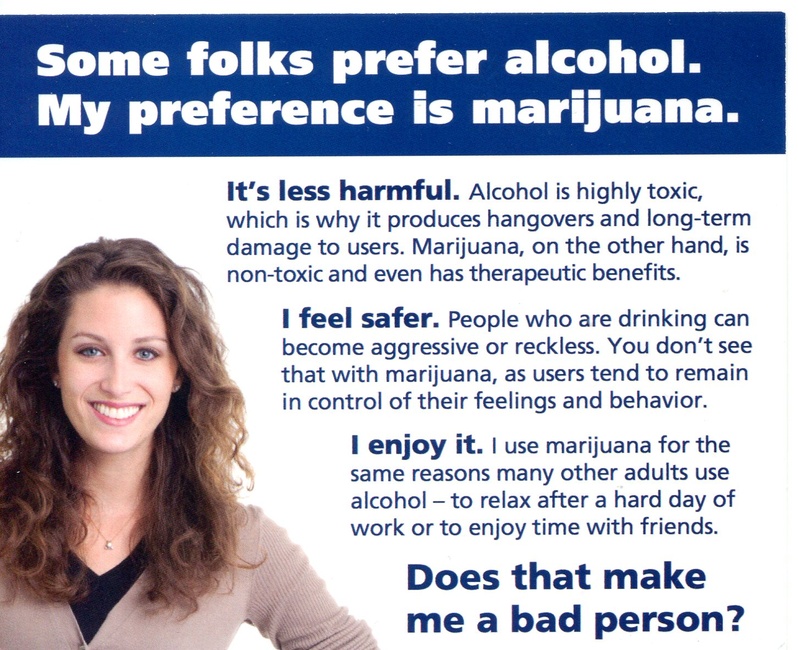PORTLAND – City residents will likely vote in November on whether they want Portland to be among a handful of cities nationwide – and the first in Maine – to legalize possession of small amounts of marijuana.
Although the measure would make a strong political statement, it would have little real effect: State and federal laws against possession could still be enforced in the city, and the ordinance wouldn’t set up a legal way to distribute recreational marijuana like Maine’s system of prescriptions, caregivers and dispensaries for medical marijuana.
On Thursday morning, supporters of the initiative handed in petitions at City Hall with more than 3,200 signatures. The city requires at least 1,500 signatures of registered voters to get a spot on the ballot. Officials in the city clerk’s office said they expect to be able to validate the petitions in a week or so.
The measure would allow people 21 and older to possess as much as 2.5 ounces of marijuana. It would prohibit smoking of marijuana in public and would allow landlords to bar it in their apartments by posting “no smoking” signs.
Supporters said Maine’s already lenient law, which calls for small civil fines for first offenses of possession of less than 1.25 ounces, is too much.
The Legislature “has rejected (a) sane drug policy (and) continued pursuing the failed policy of prohibition,” said Tom MacMillan, chairman of the Portland Independent Committee, which led the petition drive.
Removing any penalties for possession of small amounts of marijuana “would save the city of Portland money by reducing police hours spent on pursuing marijuana use by adults 21 and older,” he said.
“We’re definitely breaking ground,” said David Boyer, Maine political director of the Marijuana Policy Project. He noted that only a handful of cities have repealed possession laws, including New Orleans two years ago and Denver in 2005.
Dozens of communities nationwide have adopted policies that direct police to make enforcement of marijuana laws a low priority. A similar initiative failed two years ago in Portland because supporters did not collect enough valid signatures.
Boyer acknowledged that the proposed ordinance wouldn’t have much practical impact because it has no mechanism for marijuana smokers to buy pot legally.
“We’ll have to sort things out over time on the purchasing side,” he said.
E. James Burke, a professor at the University of Maine School of Law, said the ordinance would advance the debate over marijuana but accomplish little else.
In Maine, marijuana is legal only for people with prescriptions. And federal law criminalizes marijuana possession even for those with prescriptions.
Even if the initiative passes, Portland won’t be saying “it’s OK for John Doe to walk into town and sell drugs,” Burke said. But “it gets the conversation going and hopes to move the question along. Will it make a difference to the state? Maybe eventually.”
A proposal to legalize possession of small amounts of marijuana statewide and develop a system for selling the drug fell short in an 8-3 vote by a legislative committee earlier this year. Its supporters may instead seek a statewide referendum.
Last fall, voters in Washington state and Colorado approved legal recreational use of marijuana. Supporters in Maine said a similar vote in Portland would create momentum to do the same here.
Many law enforcement officers oppose legalizing the drug for recreational use.
“Marijuana is a gateway drug,” said Kennebec County Sheriff Randall Liberty, who is president of the Maine Sheriffs’ Association. “Nobody goes from drinking a beer to shooting up heroin.”
Proponents of Portland’s proposal compare marijuana to alcohol use, and are billing their effort as a public safety issue. The umbrella organization backing the initiative, Citizens for a Safer Portland, said its campaign will stress the point that drinking can lead to violent behavior, while marijuana smokers use it as a way to relax and socialize.
A card distributed at a news conference before the petitions were submitted Thursday says alcohol is “highly toxic” while marijuana “is non-toxic and even has therapeutic benefits.”
The campaign seeks to change the stereotypical image of pot smokers, showing a smiling woman next to text that says she smokes marijuana “to relax after a hard day of work or to enjoy time with friends.”
But Liberty said the issue isn’t whether alcohol or marijuana is worse.
“I’m not saying thumbs up to alcohol and thumbs down to marijuana,” he said, scoffing at the notion that any legal system for selling marijuana could cut down teenagers’ use of marijuana because they would be subject to ID checks if they tried to buy pot at a store.
“They’re using alcohol (laws) as an example of success?” he said.
But Boyer, with the Marijuana Policy Project, said legalizing marijuana would create a system to regulate its use by anyone younger than 21.
He said studies in countries with more lenient laws have shown that marijuana use is lower, overall and among young people. Tighter regulations have helped lead to a reduction in youths smoking, he said, and lawmakers should aim for the same result with marijuana.
“Education and regulation are what’s caused tobacco use to go down,” he said. “Drug dealers don’t card and they don’t ID.”
Edward D. Murphy can be contacted at 791-6465 or at:
emurphy@pressherald.com
CORRECTION: This story was revised at 8:52 p.m. on Thursday, May 30, 2013 to reflect that Randall Liberty is the sheriff of Kennebec County, not Penobscot County.
Send questions/comments to the editors.






Success. Please wait for the page to reload. If the page does not reload within 5 seconds, please refresh the page.
Enter your email and password to access comments.
Hi, to comment on stories you must . This profile is in addition to your subscription and website login.
Already have a commenting profile? .
Invalid username/password.
Please check your email to confirm and complete your registration.
Only subscribers are eligible to post comments. Please subscribe or login first for digital access. Here’s why.
Use the form below to reset your password. When you've submitted your account email, we will send an email with a reset code.